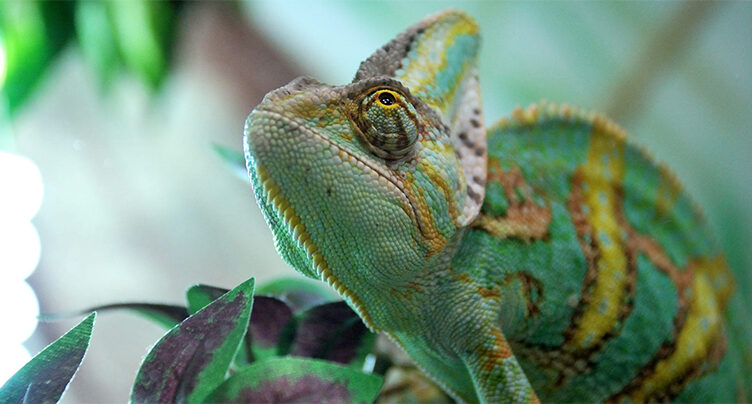Pets can be more than just fluffy cats, friendly dogs, and talkative parrots. Some people keep exotic reptiles at home, like chameleons. This unusual pet requires special care, specific living conditions, and a particular diet that is essential for the health of reptiles.
In this article, we will explore the dietary needs of chameleons, what food they can and cannot eat, the proper quantities, and their drinking habits.
Feeding Chameleons in the Wild
In their natural habitats, chameleons eat various insects, birds, small lizards, and other mammals.
The majority of their daily diet consists of insects such as spiders, crickets, worms, flies, caterpillars, etc. These intelligent animals avoid stinging or poisonous insects. Even when very hungry, a chameleon will not hunt potentially dangerous prey.
A small portion of their diet includes tree fruits and green leaves.
Feeding Chameleons at Home
Exotic lizards living in homes require a special diet. Reptiles cannot eat regular human food. While vegetables and fruits are part of their diet, the primary food for chameleons should be of animal origin.
Animal-Based Food
Animal-based food for chameleons consists of insects. The most beneficial food includes crickets and grasshoppers.
Other insects suitable for feeding chameleons include:
- Feeder cockroaches
- Grasshoppers
- Flies
- Spiders
- May beetles
- Dragonflies
- Every 3-4 weeks, you can offer zophobas, waxworm larvae, and mealworms (frequent feeding of these insects may lead to liver failure).
For larger chameleon species, small mice can be offered as food, but this treat should not be given more than twice a month.
Plant-Based Food and Vitamin Supplements
Home lizards can be fed plant-based foods like green leaves, vegetables, and certain fruits.
Foods suitable for chameleons include:
- Green lettuce leaves
- Dandelions
- Grapes
- Cherries
- Bananas
- Melons and watermelons
- Mandarins and oranges
- Kiwi
- Apples
Special mineral and vitamin supplements are made for home reptiles, necessary for a balanced diet and to maintain physical health.
Beneficial Vitamins for Chameleons:
- Calcium: An essential element for reptiles, it strengthens bones and improves dental health. A deficiency can lead to metabolic bone disease (rickets).
- Phosphorus: A useful component that regulates the proper balance of vitamins and minerals in the body. It needs to be consumed in the correct ratio with calcium.
- Vitamin D3: Strengthens the immune system and helps maintain normal levels of calcium and phosphorus in the lizard’s body.
- Vitamin A: Ensures normal functioning of the visual organs and supports bone health and immunity.
Even the most beneficial vitamins and minerals can cause serious health issues in excessive amounts. An excess of phosphorus can lead to heart and kidney failure. High levels of vitamin A can cause nervous system disorders and liver problems. Excessive vitamin D3 negatively affects muscle and nerve health.
The optimal solution is to purchase specialized food with a properly balanced ratio of beneficial trace elements.
